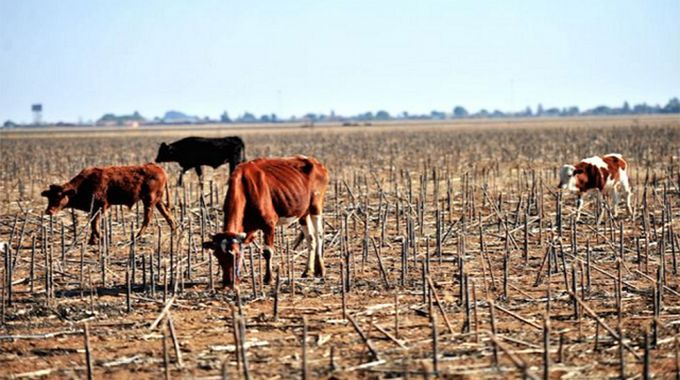Letters to the Editor: Drought, machete gangs: The double edged sword

Lovemore Chikova
Zimbabwe’s development is anchored on various variables, but mining and agriculture always stand out because of their huge contribution to economic growth.
The mining sector is critical in generating foreign currency, contributing about 70 percent of the country’s forex earnings, while it is estimated the sector accounts for between 12 percent and 16 percent of Gross Domestic Product (GDP).
In fact, Government has since made it clear that it wants mining to anchor economic growth and transformation towards its Vision 2030 of making Zimbabwe a middle income economy.
Gold has since become one of Zimbabwe’s largest earners of foreign currency, raking in more than $1 billion in exports annually, on the back of Government’s support for informal mining to boost production.
On the other hand, agriculture has been doing wonders for the country to the extent of being labelled the spine of Zimbabwe’s economy, with many people, including those in the rural areas, deriving their livelihoods from agricultural economic activities.
The sector contributes almost 17 percent of the country’s GDP, while it employs and supports nearly 70 percent of the population, according to statistics provided by the Food and Agriculture Organisation.
Apart from creating employment, many industries depend on agriculture for their raw materials.
Tobacco, for example, has emerged as the main crop in terms of economic benefits, with the numbers growing each year, and in 2019, US$529 million was generated from the exports for 259 million kg.
The exports were to different destinations — Africa, America, European Union, Far East, Middle East and Oceania.
While mining and agriculture have firmed as the anchor to the country’s development, there are problems affecting these two sectors of late, which call for urgent action.
Mining and agriculture have come under serious attack, threatening their potential to fully contribute to economic recovery.
While mining is under threat from man-made catastrophe — the machete gangs marauding through mining areas, agriculture is being threatened by natural causes.
Let’s look at the agricultural sector first.
Droughts in the last few years has become the most outstanding threat to agricultural production, and with the occurrence attributed to climate change.
Climate change has been blamed for other weather phenomenon like cyclones that have resulted in floods that badly affect agriculture.
This year has been threatened by yet another drought, which has already killed crops and livestock in many provinces, affecting locals’ survival.
While no one can stop drought from occurring, there is a lot that can be done to mitigate against its effects so that agricultural production can still continue.
The answer to drought-induced hunger lies in developing irrigation.
Zimbabwe has an advantage in that it has lots of water bodies throughout its provinces, but these water bodies have been under-utilised in terms of drawing water for agricultural purposes.
The giant Tokwe-Mukosi Dam in the Ngundu area of Chivi quickly comes to mind.
Nearly three years since the dam was commissioned, there has been much talk about coming up with a Master Development Plan, which seems to take eternity to draw.
In the meantime, people in drought stricken Chivi and other parts of Masvingo who had hoped to draw water from the dam for irrigation still wallop in hunger while bragging about the presence of the biggest inland water body in the country.
Of what help is Tokwe-Mukosi Dam to the country if a development plan that seems never to come can hold everyone to ransom?
But Tokwe-Mukosi is not alone in this case, there are many other water bodies whose water is not being utilised for food production despite everyone touting irrigation as the solution to frequent droughts that have been facing the country in recent years.
It appears there is a lot of lip service when it comes to the development of irrigation, yet it is one of the best solutions to mitigate against the effects of droughts.
Apart from causing hunger, the effects of drought mean the country has to fork out the little available foreign currency to import food, like what is happening at the moment where maize is being imported from various countries.
Government and its partners are simply supposed to establish new irrigation schemes and rehabilitate infrastructure where it is available, as an immediate answer to the droughts that are set to increase as the effects of climate take a toll.
There have been many irrigation policies drawn since independence, and it is time for them to be dusted and revisited for implementation.
The Ministry of Agriculture, Lands, Water and Rural Resettlement should prioritise the development of irrigation schemes, otherwise all the efforts to ensure food security come to naught.












Comments